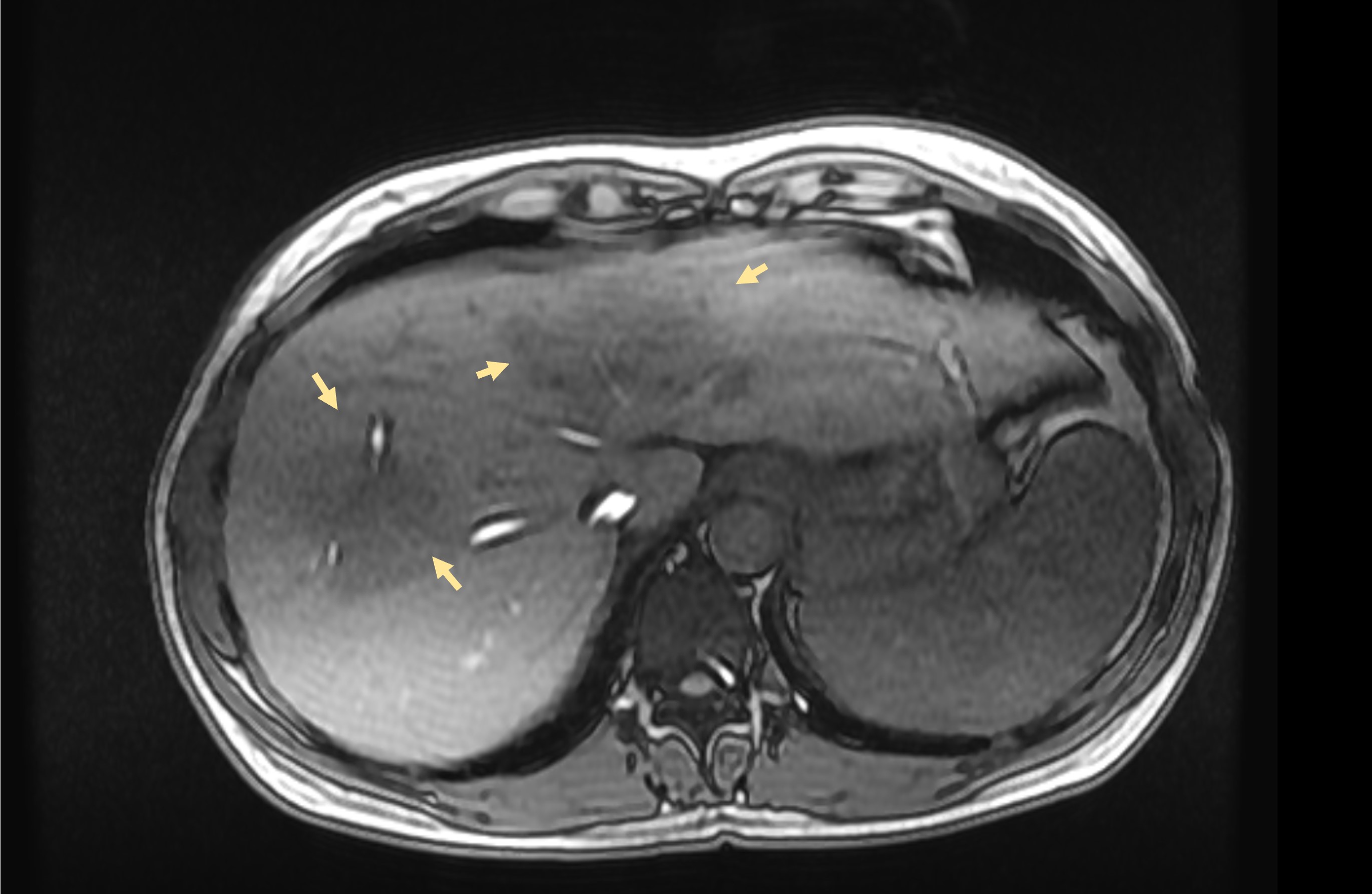Tuesday Poster Session
Category: Liver
P4790 - An Unusual Case of Pregnancy-Related Acute Liver Injury in Early Gestation
Tuesday, October 29, 2024
10:30 AM - 4:00 PM ET
Location: Exhibit Hall E

Has Audio

Max L. Goldman, MD
Kaiser Permanente
San Francisco, CA
Presenting Author(s)
Max L. Goldman, MD, Stacy M. Yadava, MD, Brenton G. Davis, MD, Lawrence J. Leung, MD, MPH, Xiaoran Li, MD, Nizar Mukhtar, MD
Kaiser Permanente, San Francisco, CA
Introduction: Abnormal liver enzymes occur in 3% of pregnancies, and a systemic diagnostic approach is essential for management. After first ruling out normal physiologic changes of pregnancy and common causes of acute liver injury (ALI), consideration can be given to pregnancy-specific etiologies. Among these, HELLP causes severe illness, normally presenting with 3rd trimester or peripartum epigastric pain accompanied by significant ALI, thrombocytopenia, hemolysis, hypertension, and proteinuria. We present a highly unusual case of HELLP syndrome occurring early in pregnancy.
Case Description/Methods: A healthy 37-year-old woman presented with 2 days of abdominal pain, at 17 weeks of gestation. The pain was an acute onset, progressive, 8/10 epigastric ache with radiation to the back. She had normal vital signs, significant right upper quadrant tenderness to palpation, and a normal pelvic exam. Labs revealed a hemoglobin of 10.6 g/dL, platelets of 153K/μL, ALT of 75 and AST of 60 U/L. After 36 hours, her hemoglobin worsened to 7.3, platelets to 61, ALT to 325, and AST to 235. Lactate, INR, lipase, and renal function remained normal. She had no proteinuria, and viral hepatitis and autoimmune serologies were negative. An ultrasound demonstrated a normal biliary system, hepatic parenchyma, and portal vasculature. MRI revealed two 5-6cm areas of T2 hyper- and T1 hypo-intensity in the left and right hepatic lobes, with periportal edema yet without vascular displacement, hemorrhage, or fat deposition.
Given her rapid decline, she was taken for urgent termination of pregnancy. Within hours, her abdominal pain resolved, and by 48 hours, her transaminases were improving. Repeat imaging 4 days later demonstrated improvement in the abnormal hepatic enhancement. Her Coombs, lupus anticoagulant, and anti-cardiolipin antibody testing returned positive.
Discussion: We present a very atypical case of severe HELLP syndrome, occurring during the first half of pregnancy and in the absence of proteinuria or hypertension. Only 15% of cases are known to present without these two important findings. Furthermore, she had newly diagnosed antiphospholipid syndrome, a known yet rare comorbid condition which may have contributed to the early-onset of HELLP. However, there is a paucity of literature regarding HELLP occurring before 20 weeks gestation. Despite the atypical presentation, early recognition of the cardinal signs of HELLP is essential to preventing significant maternal morbidity or death via management with early delivery.

Disclosures:
Max L. Goldman, MD, Stacy M. Yadava, MD, Brenton G. Davis, MD, Lawrence J. Leung, MD, MPH, Xiaoran Li, MD, Nizar Mukhtar, MD. P4790 - An Unusual Case of Pregnancy-Related Acute Liver Injury in Early Gestation, ACG 2024 Annual Scientific Meeting Abstracts. Philadelphia, PA: American College of Gastroenterology.
Kaiser Permanente, San Francisco, CA
Introduction: Abnormal liver enzymes occur in 3% of pregnancies, and a systemic diagnostic approach is essential for management. After first ruling out normal physiologic changes of pregnancy and common causes of acute liver injury (ALI), consideration can be given to pregnancy-specific etiologies. Among these, HELLP causes severe illness, normally presenting with 3rd trimester or peripartum epigastric pain accompanied by significant ALI, thrombocytopenia, hemolysis, hypertension, and proteinuria. We present a highly unusual case of HELLP syndrome occurring early in pregnancy.
Case Description/Methods: A healthy 37-year-old woman presented with 2 days of abdominal pain, at 17 weeks of gestation. The pain was an acute onset, progressive, 8/10 epigastric ache with radiation to the back. She had normal vital signs, significant right upper quadrant tenderness to palpation, and a normal pelvic exam. Labs revealed a hemoglobin of 10.6 g/dL, platelets of 153K/μL, ALT of 75 and AST of 60 U/L. After 36 hours, her hemoglobin worsened to 7.3, platelets to 61, ALT to 325, and AST to 235. Lactate, INR, lipase, and renal function remained normal. She had no proteinuria, and viral hepatitis and autoimmune serologies were negative. An ultrasound demonstrated a normal biliary system, hepatic parenchyma, and portal vasculature. MRI revealed two 5-6cm areas of T2 hyper- and T1 hypo-intensity in the left and right hepatic lobes, with periportal edema yet without vascular displacement, hemorrhage, or fat deposition.
Given her rapid decline, she was taken for urgent termination of pregnancy. Within hours, her abdominal pain resolved, and by 48 hours, her transaminases were improving. Repeat imaging 4 days later demonstrated improvement in the abnormal hepatic enhancement. Her Coombs, lupus anticoagulant, and anti-cardiolipin antibody testing returned positive.
Discussion: We present a very atypical case of severe HELLP syndrome, occurring during the first half of pregnancy and in the absence of proteinuria or hypertension. Only 15% of cases are known to present without these two important findings. Furthermore, she had newly diagnosed antiphospholipid syndrome, a known yet rare comorbid condition which may have contributed to the early-onset of HELLP. However, there is a paucity of literature regarding HELLP occurring before 20 weeks gestation. Despite the atypical presentation, early recognition of the cardinal signs of HELLP is essential to preventing significant maternal morbidity or death via management with early delivery.

Figure: Figure 1: Magnetic resonance imaging demonstrating two ill-defined areas of patchy enhancement measuring 6 and 5cm in the left and right hepatic lobes with periportal edema
Disclosures:
Max Goldman: Eli Lilly – Stock-publicly held company(excluding mutual/index funds). Madrigal – Stock-publicly held company(excluding mutual/index funds). Novo Nordisk – Stock-publicly held company(excluding mutual/index funds).
Stacy Yadava indicated no relevant financial relationships.
Brenton Davis indicated no relevant financial relationships.
Lawrence Leung indicated no relevant financial relationships.
Xiaoran Li indicated no relevant financial relationships.
Nizar Mukhtar indicated no relevant financial relationships.
Max L. Goldman, MD, Stacy M. Yadava, MD, Brenton G. Davis, MD, Lawrence J. Leung, MD, MPH, Xiaoran Li, MD, Nizar Mukhtar, MD. P4790 - An Unusual Case of Pregnancy-Related Acute Liver Injury in Early Gestation, ACG 2024 Annual Scientific Meeting Abstracts. Philadelphia, PA: American College of Gastroenterology.
